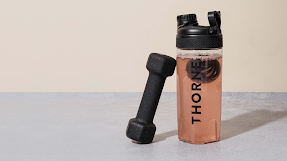The Benefits of Creatine for Athletes | Is creatine a steroid ?
Here's how creatine works:
1) ATP Regeneration: Adenosine triphosphate (ATP) is the primary energy currency of cells in the body. During intense physical activities like weightlifting, sprinting, or jumping, the muscles require a rapid supply of ATP. Creatine helps regenerate ATP by donating a phosphate group, turning adenosine diphosphate (ADP) back into ATP. This process allows muscles to contract repeatedly and generate more force.
2) Buffering Lactic Acid: Creatine also helps buffer the buildup of lactic acid in muscles during high-intensity exercise. Lactic acid is a byproduct of anaerobic metabolism and can lead to muscle fatigue and discomfort. Creatine's buffering effect delays the onset of muscle fatigue, allowing individuals to push harder and longer during workouts.
3) Improved Muscle Recovery: Creatine has been shown to reduce muscle damage and inflammation following intense exercise, which can aid in the recovery process. This means athletes may experience less muscle soreness and a faster return to peak performance.

1) Enhanced Energy Production: Endurance athletes often rely on a steady stream of energy to sustain prolonged efforts. Creatine helps by enhancing the body's ability to regenerate ATP (adenosine triphosphate), the molecule responsible for delivering energy to your muscles. This means you can maintain a more consistent level of effort over longer distances.
2) Reduced Muscle Fatigue: Creatine has been shown to buffer against the buildup of lactic acid in muscles during high-intensity exercise. This buffering effect delays the onset of muscle fatigue, allowing you to push harder for longer durations
3) Improved Recovery: Intense endurance training can take a toll on your muscles. Creatine can assist in the recovery process by reducing muscle damage and inflammation, ensuring you're ready for your next training session.
Numerous studies have highlighted the positive impact of creatine on endurance performance:
A study published in the Journal of Applied Physiology found that creatine supplementation improved the performance of elite swimmers in a series of repeated sprints.
Research in the Journal of Strength and Conditioning Research demonstrated that creatine supplementation increased the endurance capacity of long-distance runners.
Cyclists also stand to benefit, with a study in the European Journal of Applied Physiology reporting that creatine improved time-to-exhaustion in high-intensity cycling.
So, how can you harness the benefits of creatine for your endurance training?
1) Dosage: Start with a loading phase of around 20 grams per day (divided into four doses) for 5-7 days, followed by a maintenance phase of 3-5 grams per day. Always consult a healthcare professional before starting any supplementation regimen.2)Timing: Taking creatine before and after your training sessions can optimize its effects.








This is our very first blog so please support us🥰
ReplyDelete